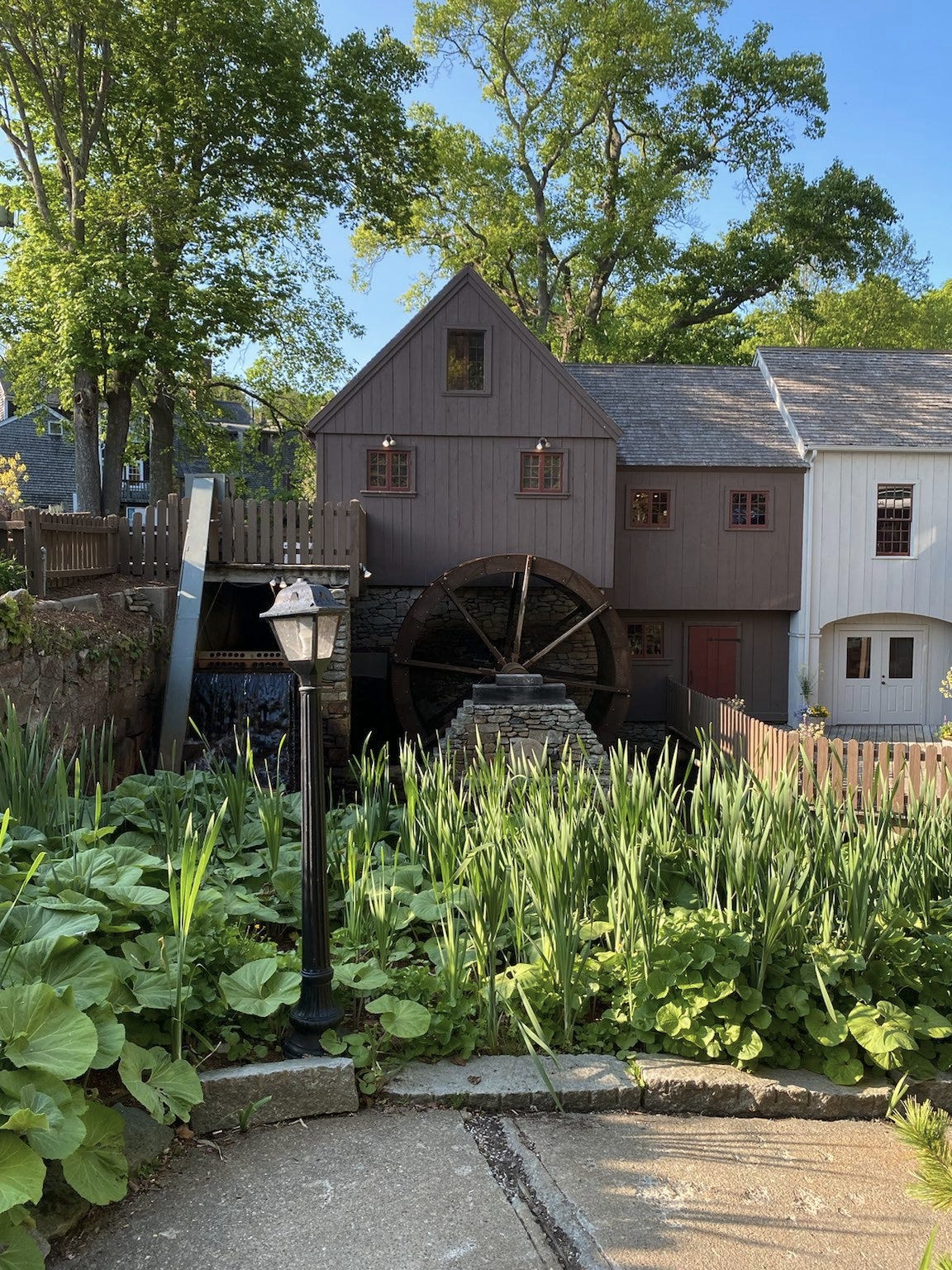Plymouth Rock's Grist Mill: America's First Businesses Were Public Utilities
At Plymouth, I saw one of America's first independent businesses. It had regulated prices and consumer protection laws.
Welcome to BIG, a newsletter on the politics of monopoly power. If you’d like to sign up to receive issues over email, you can do so here.

In 1620, Pilgrims landed at Plymouth to establish a colony and establish “New England.” Some of them came because they were estranged from the Church of England, others just wanted to make money. It was above all a commercial and political venture to set up a base in the North American continent that Europeans had been visiting for over a century for fishing, timber, and furs.
Settling the land was rough, because you had to import everything mechanical and all non-basic commodities from infrequent cargo ships that took months to cross the Atlantic. For sixteen years, settlers had to make break by grinding corn in a mortar and pestle, spending hours every day in this unpleasant task. Back in England, somewhat complex grist mills powered by rivers or streams did this unpleasant chore. These mills used huge millstones and an elaborate system of gears to automate the grinding of grain, usually wheat (but corn in the new world).
Millers were highly paid and well-respected businessmen. Locals would bring their grain to the mill and the miller would grind it and take a share as payment, that share being regulated by the town. Because every farmer had to grind their grains, mill often became social and commercial centers, and millers would oversee legal agreements arranged at their mill.
Finally, in 1636, Colonel John Jenney set up a grist mill to grind corn for the Pilgrims. It’s not the oldest mill in the northeast; by this time, a mill had already been set up in the Massachusetts Bay Colony, aka Boston, which was already bigger than Plymouth. But mills were among the first substantial independent businesses set up in the colonies. The Plimoth Grist Mill is still around as a working mill, preserved by modern-day millers who love grinding grain and historic preservation. These millers showed me some snippets of court documents.
Grist mills were public utilities. Here’s the town’s original chartering of the Plimoth Grist Mill, though it wasn’t at first chartered to Jenney. Not only did the colony authorize the charter, but it gave a monopoly, noting that “it shall not be lawful for any other to set up a worke of that kinde except it be for his own use or freely without toll or any other consideration whatsoever.”
Millers had monopoly power because the market for farmers was hyperlocal. Not only was the closest rival, mill very far away, but it was difficult to move your corn regardless. Dried corn lasts a long time, but flour begins to go bad quickly so you can’t grind very much of your crop at one time. As such, the local mill was really the only mill. So what did the colony do? Regulate!
Here’s the colony setting prices for the miller, who got to keep one sixteenth of what he was grinding. The colony also imposed price transparency by forcing the miller to have a scale with weights and measures so farmers could make sure they weren’t being cheated.
And there were of course consumer protection rules as well. Here’s a law the colony passed asserting that the miller had to “grind theire Coren suffecently” or the miller would have to pay damages to the aggrieved party, plus a fine.
At some point, Jenney died and passed on the mill to different owners. Forty five years after its founding, the mill was run poorly and engendered many complaints to the town government. Finally, the Plymouth town government ordered the sale of the mill to a new group who would run it better, with the threat that if the owner refused, the town would grant a charter to a group who “intend to build another mill.” In other words, the mill would lose its monopoly status.
We’ve always understood that prices, regulations, consumer protection and market structure have both public and private character. The colony didn’t build a public mill, though it had public fort, meeting house, and church. It authorized the construction of a mill by a private individual for his own profit. But that doesn’t mean the commercial choices were ‘private.’ The community set up the rules. And that’s still how it works today, even if we want to pretend there are clean distinctions between the public and private sectors.
At any rate, if you’re near eastern Massachusetts, visit the Plimoth Grist Mill.






I've been to that mill, but had no idea about the history.
Matt should interview Adam Winkler, author of We The Corporations, the story of how corporations gained a stranglehold on our country [they fought pretty dirty], which is a great companion volume to Matt's Goliath. I'd love to read that interview.